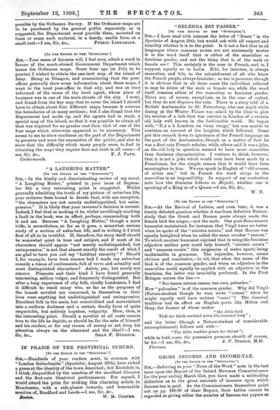"DELENDA EST PASSER."
Pro Till EDITOR Or TEl " arnorwroml have read with interest the letter of "Senex " in the Spectator of August 29th, but would ask with all respect and humility whether it is to the point. Is it not a fact that in all languages where common nouns are not necessarily neuter it is the word itself that is either of the masculine or feminine gender, and not the thing that is of the male or female sex? This certainly is the case in French, and is, I suppose, equally so in Latin. Bibi, for instance, is always masculine, and bite, to the astonishment of all who know the French people, always feminine; so too is personae, though it is obvious that in all these cases the individual referred to may be either of the male or female sex, while the word itself remains either of the masculine or feminine gender. There are, of course, exceptions, as in the case of enfant, but they do not disprove the rule. There is a story told of a British Ambassador to St. Petersburg, who one night while dining at the Winter Palace was asked by the Czar to give his version of a tale that was current in London of a certain old lady well known in the fashionable world. He began with, "Ii y a a Londres, an vieux vierge," but was unable to continue on account of the laughter which followed. Some put this remark down to ignorance of the French language on the part of the Ambassador, though as a matter of fact he was a first-rate French scholar, while others said it was a joke, as the old lady in question seemed to have more masculine than feminine characteristics. I venture to think, however, that it is not a joke which would ever have been made by a Frenchman, for the simple reason that it would have been meaningless to him. We can speak in English of "old women of either sex," but in French the word vierge in the masculine is an impossibility. In support of my contention note how the feminine follows sa Majesti, whether one is speaking of a King or of a Queen.—I am, Sir, &a., W. N.










































 Previous page
Previous page